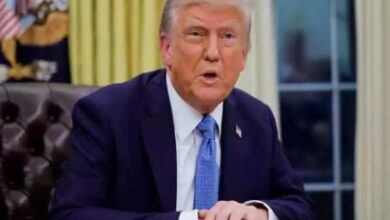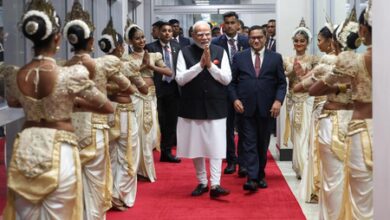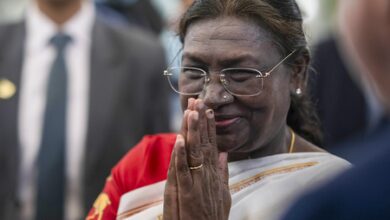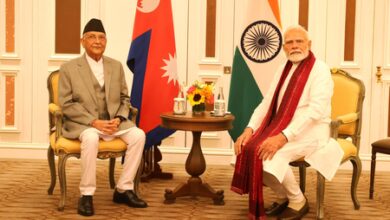PM Modi meets Thai counterpart as India and Thailand set to elevate ties to Strategic Partnership
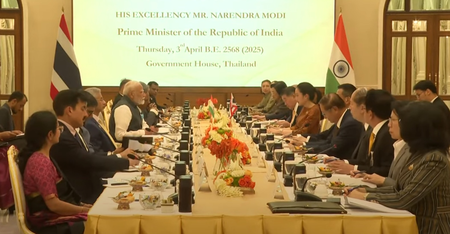
Bangkok, April 3 (IANS) Prime Minister Narendra Modi and Thailand PM Paetongtarn Shinawatra began bilateral discussions in Bangkok on Thursday afternoon during which they are expected to not only review bilateral cooperation but also chart the way for future partnership between the countries.
The relations between both countries are set to be elevated to a Strategic Partnership following the discussions.
This is PM Modi’s second meeting with the Thai counterpart. He had earlier met her on the margins of the ASEAN Summit in Vientiane in October last year. Both leaders will review the progress in the entire gamut of bilateral relations and ways to add greater momentum to the India-Thailand bilateral partnership besides also exchanging views on the regional and multilateral issues. They will also witness the signing of several bilateral documents.
Earlier in the day, Prime Minister Modi arrived in Bangkok on his third visit to the country at the invitation of PM Shinawatra to participate in the 6th BIMSTEC Summit to be held on Friday by Thailand, the current BIMSTEC Chair and for an Official Visit.
This is PM Modi’s third visit to Thailand. He had attended the ASEAN and East Asia Summit that was hosted by Thailand in November 2019 and earlier – in November 2016 – been to Bangkok en route to Tokyo to pay homage to the late King Rama IX.
India and Thailand are maritime neighbours with shared civilizational bonds which are underpinned by cultural, linguistic, and religious ties.
“During my official visit, I will have the opportunity to engage with Prime Minister Shinawatra and the Thai leadership, with a common desire to elevate our age-old historical ties, which are based on the strong foundations of shared culture, philosophy, and spiritual thought,” PM Modi said in his departure statement early Thursday morning.
Thailand is also India’s valuable partner in the ‘Act East’ policy, Vision for the Indo-Pacific, and in BIMSTEC. The bilateral ties between both countries remain multifaceted and cover a range of joint cooperation from defence and security to trade and investment, connectivity, science, technology, innovation, education, space, health, culture, tourism, and people-to-people exchanges.
“Thailand is the third-largest economy in ASEAN and our fourth-largest trading partner after Singapore, Indonesia, and Malaysia in the ASEAN region. Our trade is almost $15 billion, and our exports to Thailand are about $5 billion, and imports from Thailand are about almost $10 billion,” said Jaideep Mazumdar, Secretary (East) at the Ministry of External Affairs (MEA) ahead of the Prime Minister’s official visit.
“Last year, at the request of the government of Thailand, India had sent the holy relics of Lord Buddha and two of his main disciples for a 25-day exposition, over five different cities of Thailand. This was from 25th February to 9th March, and around four million people paid their obeisance to the relics. The unprecedented success of this exposition is a reaffirmation of our age-old, indelible religious and cultural ties between the two countries,” he added.
This would also be the first physical meeting of the BIMSTEC Leaders since the 4th BIMSTEC Summit in Kathmandu, Nepal in 2018. The last BIMSTEC Summit was hosted by Sri Lanka in March 2022 in virtual format. The theme for the current summit is ‘BIMSTEC – Prosperous, Resilient and Open’. The leaders are expected to deliberate on ways and means to infuse greater momentum to BIMSTEC cooperation during the Summit.
The leaders from the Bay of Bengal countries are also expected to discuss various institution and capacity building measures to augment collaboration within the BIMSTEC framework. India has been taking a number of initiatives in BIMSTEC to strengthen regional cooperation and partnership, including in enhancing security; facilitating trade and investment; establishing physical, maritime and digital connectivity; collaborating in food, energy, climate and human security; promoting capacity building and skill development; and enhancing people-to-people ties.
–IANS
int/as

